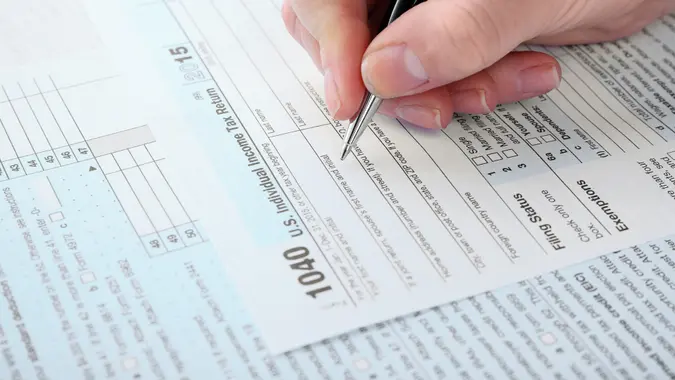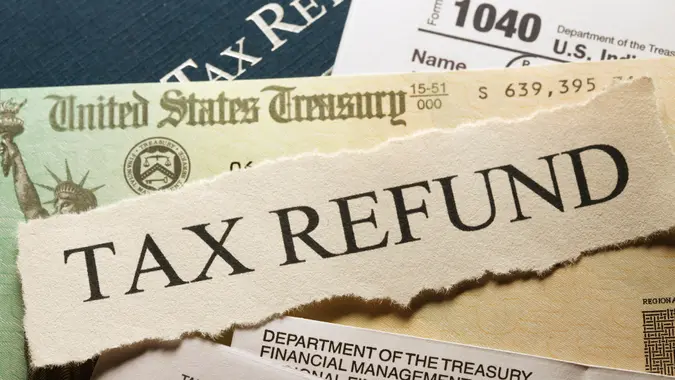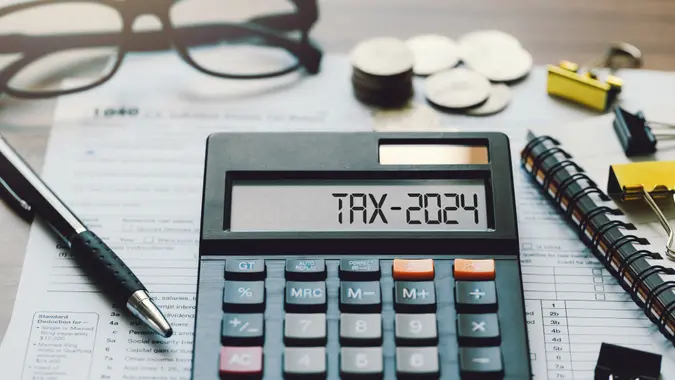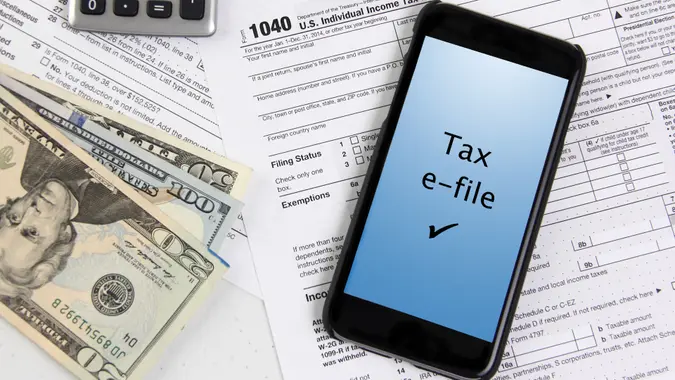Tax Benefits of Owning a Home: How Much You Could Be Saving

Commitment to Our Readers
GOBankingRates' editorial team is committed to bringing you unbiased reviews and information. We use data-driven methodologies to evaluate financial products and services - our reviews and ratings are not influenced by advertisers. You can read more about our editorial guidelines and our products and services review methodology.

20 Years
Helping You Live Richer

Reviewed
by Experts

Trusted by
Millions of Readers
Buying a home is one of the most expensive commitments most people will ever make, and a mortgage is often the largest bill you have each month. While homes come with a variety of expenses, from maintenance to home improvements, there are some ways you might be able to save money as well.
Whether you are buying or selling your home, you may be surprised at some of the tax benefits you can get and how much money they can save you.
1. Moving Expenses
It is said that after losing a job or getting married, moving is one of the most stressful life events you can go through. If you moved before 2018 but never got around to claiming your moving expense tax deduction, you might be able to file an amended claim to do so still. Also, if you are part of the armed forces and do have to move, it is good to know you can save some money when it comes to tax season. The deductions don’t cover anything the military has paid for, but moving expenses over the amount they reimbursed can be deducted.
- Travel: Lodging or gas mileage you paid for while moving from your old home to your new one could be deducted.
- Transportation: Moving vans or other forms of item storage and shipping could be deducted.
2. Home Office Deduction
People who work from home are likely to get the biggest tax write-off for their homes. If you use part of your home exclusively for business purposes, you may be eligible for a home office deduction, according to Matt Teifke, founder and CEO of Teifke Real Estate.
“This write-off allows you to deduct expenses related to the portion of your home that is used as an office, such as utilities and property taxes. However, there are strict guidelines for claiming this deduction and it is recommended to consult with a tax professional before doing so.”
3. Mortgage Interest
According to Forbes, the average APR for a 30-year fixed mortgage is 7.50%, and the average for a 15-year fixed mortgage is 6.73% as of Feb. 29, 2024. With rates this high, any savings are welcome.
Another major tax write-off for homeowners is mortgage interest.
“If you have taken out a home loan to purchase your property, the interest you pay on that loan can be deducted from your taxes. This is because the government considers mortgage interest as an expense related to owning a home,” Teifke said.
The amount of mortgage interest you can deduct depends on the type of loan and the value of your property.
“However, in most cases, homeowners are able to deduct a significant amount of their mortgage interest, leading to substantial tax savings.”
4. Home Equity Loan Interest
If you’ve taken out a home equity loan or line of credit, the interest you pay on these loans may also be tax-deductible, Teifke said.
“Similar to mortgage interest, the government considers this as an expense related to owning a home. However, there are restrictions on the amount of interest you can deduct and how the funds were used.”
He warned that it is important to keep proper records and consult with a tax professional to ensure eligibility for this deduction.
5. Property Taxes
One of the biggest tax write-offs related to owning a home is the deduction for property taxes, Teifke said.
“As a homeowner, you are required to pay property taxes on your residence to the local government. These taxes are based on the value of your property and can be quite significant. However, the good news is that property taxes can be deducted from your federal income tax return.”
This can result in a significant reduction of your taxable income and potentially save you thousands of dollars in taxes each year, he explained.
6. Tax Credits
The best bang for your buck is definitely when you start racking up tax credits. For example, if you get a $1,000 tax credit, you essentially owe $1,000 less on your taxes — it’s the amount of the deduction multiplied by your marginal tax rate, about a one-to-one ratio. This deduction is maximized when you itemize.
7. Real Estate Taxes
State property taxes and local income taxes can be deducted up to $10,000 for singles annually, or $5,000 if married and filing separately. This limit either applies to property taxes plus state and local income taxes or property taxes plus state sales tax, but not both.
These real estate taxes would be a deduction you make under sales taxes and state and local taxes.
8. Home Sale
If you have lived in the home you are selling for at least two of the last five years, you’ll get a large percentage of the profit off your sale tax-free thanks to the capital gains tax exclusion. This tax benefit states you don’t have to pay taxes on the first $250,000 of profit from selling your home if you’re single, or $500,000 if you’re married and file a joint return.
Exemptions such as these let you keep more of your money than a regular capital gains deduction would. With this in mind, make sure you save receipts for any home renovations, improvements or maintenance. Any money you have spent could be added to the base value of your house.
9. Energy-Efficient Home Improvements
To encourage environmentally friendly practices, the government offers tax incentives for homeowners who make energy-efficient improvements to their homes, Teifke said.
“These can include installing solar panels, upgrading to energy-efficient appliances, or making energy-saving renovations to your home.”
By taking advantage of these tax write-offs, you not only save money on your taxes but also contribute to a greener planet.
How Do Home Tax Deductions Work?
You’re not alone in dreading tax season. Every year comes with its own challenges in deciding how much you owe or will get back. Here are some general rules to keep in mind when figuring out how much you can save on your taxes.
- Itemized deductions vs. standard deductions: By itemizing your deductions instead of going with the standard deduction, you could save money if the itemized deductions are higher. Any excess of itemized deductions over standard deductions is what you save money on, so make sure to calculate the difference.
- Filing status: How you file and your income both affect the amount of money you save on tax benefits for owning a home. For example, a married couple buying a home would see lower savings overall than a single person with one income buying at the same price.
Sample Homeowner Deductions Based on Itemized Deduction of $40,000
| Filing Status and Standard Deduction | Itemized Deduction | Possible Tax Benefit Difference |
|---|---|---|
| Single or married filing individually: $13,850 | $40,000 | $26,150 |
| Married filing jointly: $27,700 | $40,000 | $12,300 |
| Head of household: $20,800 | $40,000 | $19,200 |
Final Take
You should always be sure to take advantage of any tax break or benefit you can. Saving money in any area of your financial planning goes a long way in the long term.
FAQ
- What are the tax advantages of owning a home?
- Here are a few tax advantages of owning a home:
- – Mortgage interest
- – Tax credits
- – Real estate taxes
- – Energy efficiency
- How much will I save in taxes if I buy a house?
- The money you save in taxes after buying a home is called property tax deduction. It allows you to reduce your taxable income by up to $10,000 – or $5,000 if married and filing separately.
- This benefits the deductible property taxes, state and local income taxes and sales taxes that you pay.
- Does owning a home give you a bigger tax return?
- Yes – building equity begins with buying a home, which is an investment compared to just paying rent. You can get many tax benefits from owning a home.
More From GOBankingRates
- 6 Expensive Costco Items That Are Definitely Worth the Cost
- How Much Does the Average Middle-Class Person Have in Savings?
- 5 Reasons You Should Consider an Annuity For Your Retirement Savings
- 10 New Cars to Avoid Buying in 2024
Our in-house research team and on-site financial experts work together to create content that’s accurate, impartial, and up to date. We fact-check every single statistic, quote and fact using trusted primary resources to make sure the information we provide is correct. You can learn more about GOBankingRates’ processes and standards in our editorial policy.
- Forbes Advisor. 2023. "Compare Current Mortgage Rates."
- TurboTax. "Tax Bracket Calculator 2022."
- Rocket Mortgage. 2023. "8 Tax Deductions For Homeowners: Your Breaks And Benefits."
- TurboTax. 2022. "The Home Office Deduction."
- Internal Revenue Service. 2022. "Publication 936 (2022), Home Mortgage Interest Deduction."
- Internal Revenue Service. 2022. "Home Mortgage Interest Deduction."
- Congress.gov. "H.R.1 - An Act to provide for reconciliation pursuant to titles II and V of the concurrent resolution on the budget for fiscal year 2018."
 Written by
Written by  Edited by
Edited by 

























